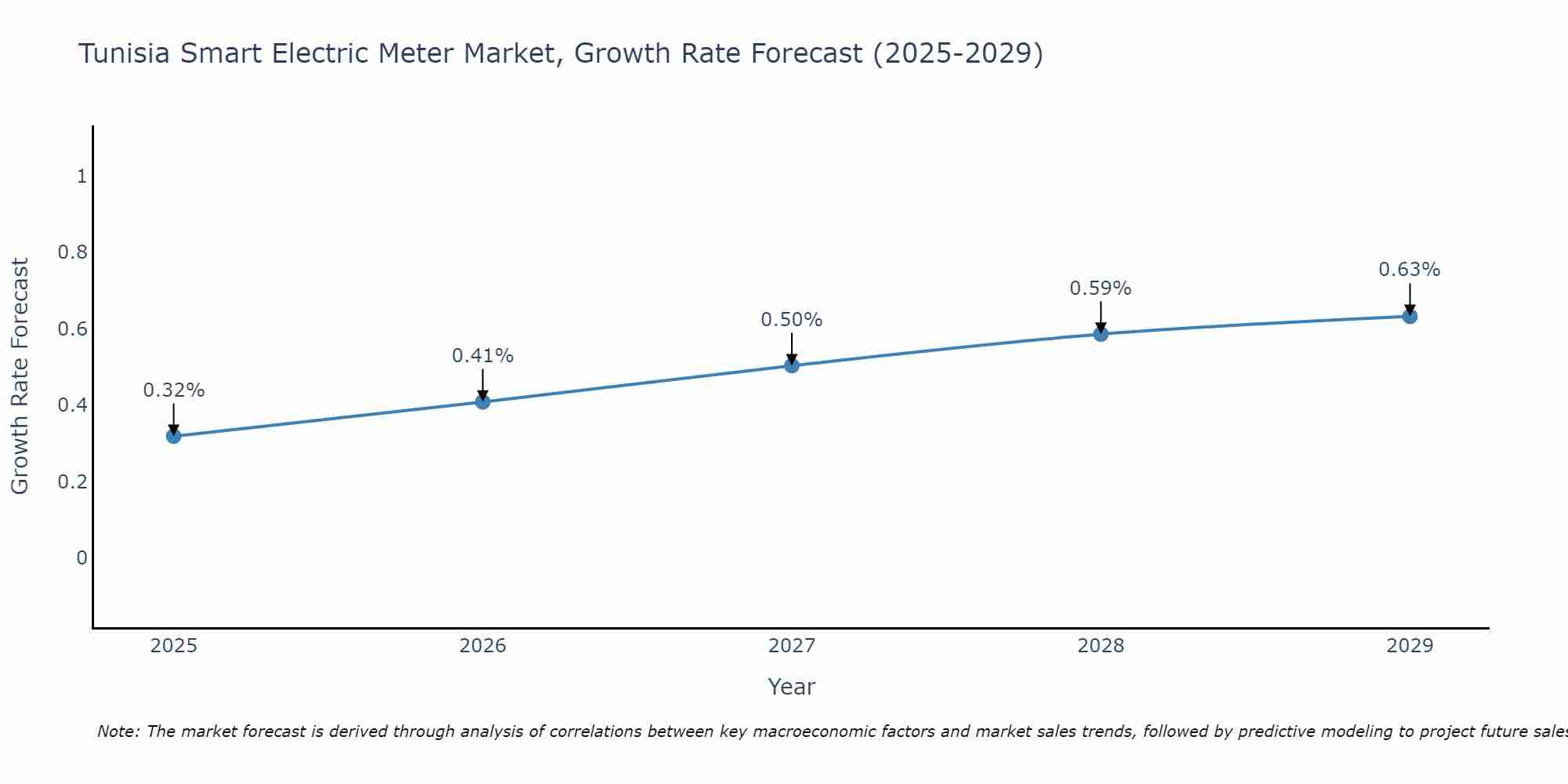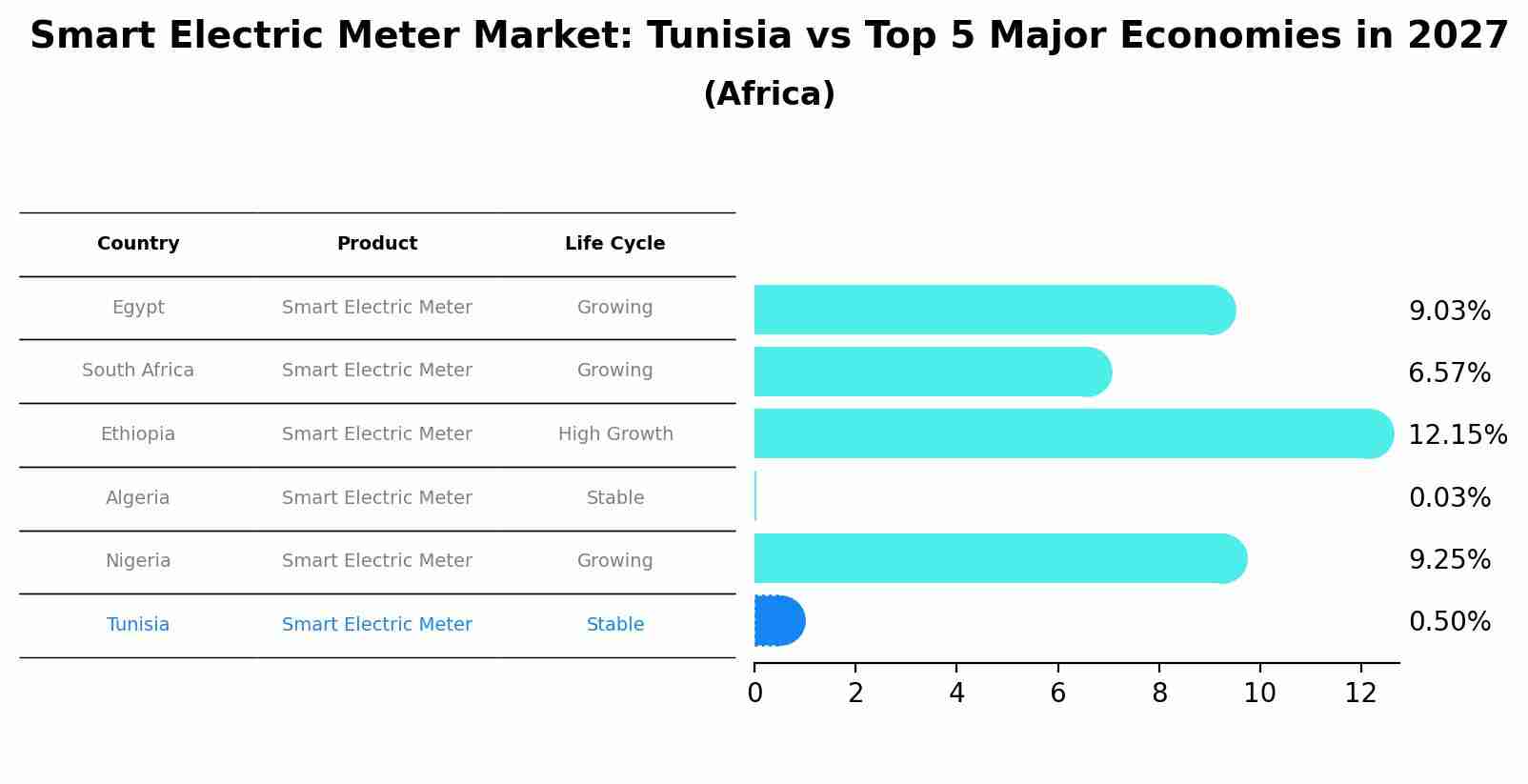Tunisia Smart Electric Meter Market Outlook | Value, Trends, COVID-19 IMPACT, Growth, Industry, Revenue, Companies, Forecast, Analysis, Size & Share
| Product Code: ETC369354 | Publication Date: Aug 2022 | Updated Date: Jul 2025 | Product Type: Market Research Report | |
| Publisher: 6Wresearch | Author: Shubham Deep | No. of Pages: 75 | No. of Figures: 35 | No. of Tables: 20 |
Tunisia Smart Electric Meter Market Size Growth Rate
The Tunisia Smart Electric Meter Market is likely to experience consistent growth rate gains over the period 2025 to 2029. Commencing at 0.32% in 2025, growth builds up to 0.63% by 2029.

Smart Electric Meter Market: Tunisia vs Top 5 Major Economies in 2027 (Africa)
Tunisia's Smart Electric Meter market is anticipated to experience a stable growth rate of 0.50% by 2027, reflecting trends observed in the largest economy Egypt, followed by South Africa, Ethiopia, Algeria and Nigeria.

Tunisia Smart Electric Meter Market Synopsis
The Tunisia Smart Electric Meter Market is experiencing steady growth driven by increasing digitalization and government initiatives for energy efficiency. Smart meters enable real-time monitoring of electricity consumption, leading to better energy management and cost savings for consumers. The market is witnessing a shift towards advanced metering infrastructure (AMI) to support two-way communication between utilities and consumers. Key players in the market are focusing on technological advancements such as integrating smart meters with IoT and cloud-based platforms for enhanced functionality. The adoption of smart meters is expected to further accelerate with the increasing emphasis on renewable energy integration and grid modernization initiatives in Tunisia. Overall, the Tunisia Smart Electric Meter Market presents opportunities for innovation and collaboration among stakeholders to drive sustainable energy practices in the country.
Tunisia Smart Electric Meter Market Trends
The Tunisia Smart Electric Meter Market is experiencing a steady growth trajectory driven by the government`s initiatives to modernize the country`s electricity infrastructure and promote energy efficiency. Key trends in the market include increasing deployment of advanced metering infrastructure (AMI) systems, integration of smart meters with IoT technology for real-time monitoring and control, and a growing emphasis on renewable energy integration. The market is witnessing a shift towards digitalization and data analytics to optimize energy usage and improve grid reliability. Smart meter manufacturers are focusing on developing innovative solutions that offer enhanced functionalities such as demand response capabilities and remote meter reading. Overall, the Tunisia Smart Electric Meter Market is poised for expansion as utilities and consumers alike recognize the benefits of smart metering technology.
Tunisia Smart Electric Meter Market Challenges
In the Tunisia Smart Electric Meter Market, some of the key challenges include regulatory barriers and policy uncertainties, limited awareness and understanding of the benefits of smart meters among consumers, high initial investment costs for implementation, interoperability issues between different metering systems, and concerns regarding data privacy and security. Additionally, the lack of skilled professionals to support the deployment and maintenance of smart metering infrastructure poses a challenge. Addressing these obstacles will be crucial for the successful adoption and widespread implementation of smart electric meters in Tunisia.
Tunisia Smart Electric Meter Market Investment Opportunities
The Tunisia Smart Electric Meter Market presents promising investment opportunities driven by government initiatives to modernize the energy infrastructure. With a growing focus on energy efficiency and sustainability, there is increasing demand for smart electric meters to enable better monitoring and management of electricity consumption. Investment prospects lie in supplying smart meters, developing software solutions for data analytics, and offering installation and maintenance services. Additionally, partnerships with local utilities and government bodies can help tap into this emerging market. As Tunisia aims to enhance its energy management capabilities and reduce electricity theft, investors in the smart electric meter sector can benefit from the country`s commitment to technological advancement in the energy sector.
Jordan Agar Market Government Policies
In Tunisia, the government has implemented policies to promote the adoption of smart electric meters in the country. These policies focus on enhancing energy efficiency, reducing electricity consumption, and improving the overall management of electricity distribution. The government has set targets for the deployment of smart meters to enable real-time monitoring of energy usage and facilitate demand response programs. Additionally, regulations have been put in place to ensure the security and privacy of consumer data collected by smart meters. The government is also working on initiatives to increase awareness among consumers about the benefits of smart meters and to incentivize their adoption through subsidies and favorable pricing structures. Overall, these policies aim to modernize the electricity grid and promote sustainable energy practices in Tunisia.
Tunisia Smart Electric Meter Market Future Outlook
The future outlook for the Tunisia Smart Electric Meter Market is promising, driven by increasing government initiatives towards modernizing the energy sector and improving energy efficiency. The deployment of smart meters is expected to increase due to the growing need for accurate billing, reduced energy losses, and better grid management. Additionally, factors such as urbanization, industrialization, and the rising adoption of smart grid technologies are anticipated to further propel market growth. The integration of advanced technologies like IoT and data analytics in smart meters will enhance their capabilities and offer more insights for both consumers and utilities. Overall, the Tunisia Smart Electric Meter Market is poised for significant expansion in the coming years, presenting opportunities for market players to innovate and expand their presence in the region.
Key Highlights of the Report:
- Tunisia Smart Electric Meter Market Outlook
- Market Size of Tunisia Smart Electric Meter Market, 2021
- Forecast of Tunisia Smart Electric Meter Market, 2031
- Historical Data and Forecast of Tunisia Smart Electric Meter Revenues & Volume for the Period 2018 - 2031
- Tunisia Smart Electric Meter Market Trend Evolution
- Tunisia Smart Electric Meter Market Drivers and Challenges
- Tunisia Smart Electric Meter Price Trends
- Tunisia Smart Electric Meter Porter's Five Forces
- Tunisia Smart Electric Meter Industry Life Cycle
- Historical Data and Forecast of Tunisia Smart Electric Meter Market Revenues & Volume By Phase for the Period 2018 - 2031
- Historical Data and Forecast of Tunisia Smart Electric Meter Market Revenues & Volume By Single for the Period 2018 - 2031
- Historical Data and Forecast of Tunisia Smart Electric Meter Market Revenues & Volume By Three for the Period 2018 - 2031
- Historical Data and Forecast of Tunisia Smart Electric Meter Market Revenues & Volume By Communication Technology Type for the Period 2018 - 2031
- Historical Data and Forecast of Tunisia Smart Electric Meter Market Revenues & Volume By Power Line Communication (PLC) for the Period 2018 - 2031
- Historical Data and Forecast of Tunisia Smart Electric Meter Market Revenues & Volume By Radio Frequency (RF) for the Period 2018 - 2031
- Historical Data and Forecast of Tunisia Smart Electric Meter Market Revenues & Volume By Cellular for the Period 2018 - 2031
- Historical Data and Forecast of Tunisia Smart Electric Meter Market Revenues & Volume By End-Users for the Period 2018 - 2031
- Historical Data and Forecast of Tunisia Smart Electric Meter Market Revenues & Volume By Industrial for the Period 2018 - 2031
- Historical Data and Forecast of Tunisia Smart Electric Meter Market Revenues & Volume By Commercial for the Period 2018 - 2031
- Historical Data and Forecast of Tunisia Smart Electric Meter Market Revenues & Volume By Residential for the Period 2018 - 2031
- Tunisia Smart Electric Meter Import Export Trade Statistics
- Market Opportunity Assessment By Phase
- Market Opportunity Assessment By Communication Technology Type
- Market Opportunity Assessment By End-Users
- Tunisia Smart Electric Meter Top Companies Market Share
- Tunisia Smart Electric Meter Competitive Benchmarking By Technical and Operational Parameters
- Tunisia Smart Electric Meter Company Profiles
- Tunisia Smart Electric Meter Key Strategic Recommendations
Frequently Asked Questions About the Market Study (FAQs):
- Single User License$ 1,995
- Department License$ 2,400
- Site License$ 3,120
- Global License$ 3,795
Search
Thought Leadership and Analyst Meet
Our Clients
Related Reports
- Canada Oil and Gas Market (2026-2032) | Share, Segmentation, Value, Industry, Trends, Forecast, Analysis, Size & Revenue, Growth, Competitive Landscape, Outlook, Companies
- Germany Breakfast Food Market (2026-2032) | Industry, Share, Growth, Size, Companies, Value, Analysis, Revenue, Trends, Forecast & Outlook
- Australia Briquette Market (2025-2031) | Growth, Size, Revenue, Forecast, Analysis, Trends, Value, Share, Industry & Companies
- Vietnam System Integrator Market (2025-2031) | Size, Companies, Analysis, Industry, Value, Forecast, Growth, Trends, Revenue & Share
- ASEAN and Thailand Brain Health Supplements Market (2025-2031) | Strategy, Consumer Insights, Analysis, Investment Trends, Opportunities, Growth, Size, Share, Industry, Revenue, Segments, Value, Segmentation, Supply, Forecast, Restraints, Outlook, Competition, Drivers, Trends, Demand, Pricing Analysis, Competitive, Strategic Insights, Companies, Challenges
- ASEAN Bearings Market (2025-2031) | Strategy, Consumer Insights, Analysis, Investment Trends, Opportunities, Growth, Size, Share, Industry, Revenue, Segments, Value, Segmentation, Supply, Forecast, Restraints, Outlook, Competition, Drivers, Trends, Demand, Pricing Analysis, Competitive, Strategic Insights, Companies, Challenges
- Europe Flooring Market (2025-2031) | Outlook, Share, Industry, Trends, Forecast, Companies, Revenue, Size, Analysis, Growth & Value
- Saudi Arabia Manlift Market (2025-2031) | Outlook, Size, Growth, Trends, Companies, Industry, Revenue, Value, Share, Forecast & Analysis
- Uganda Excavator, Crane, and Wheel Loaders Market (2025-2031) | Strategy, Consumer Insights, Analysis, Investment Trends, Opportunities, Growth, Size, Share, Industry, Revenue, Segments, Value, Segmentation, Supply, Forecast, Restraints, Outlook, Competition, Drivers, Trends, Demand, Pricing Analysis, Competitive, Strategic Insights, Companies, Challenges
- Rwanda Excavator, Crane, and Wheel Loaders Market (2025-2031) | Strategy, Consumer Insights, Analysis, Investment Trends, Opportunities, Growth, Size, Share, Industry, Revenue, Segments, Value, Segmentation, Supply, Forecast, Restraints, Outlook, Competition, Drivers, Trends, Demand, Pricing Analysis, Competitive, Strategic Insights, Companies, Challenges
Industry Events and Analyst Meet
Whitepaper
- Middle East & Africa Commercial Security Market Click here to view more.
- Middle East & Africa Fire Safety Systems & Equipment Market Click here to view more.
- GCC Drone Market Click here to view more.
- Middle East Lighting Fixture Market Click here to view more.
- GCC Physical & Perimeter Security Market Click here to view more.
6WResearch In News
- Doha a strategic location for EV manufacturing hub: IPA Qatar
- Demand for luxury TVs surging in the GCC, says Samsung
- Empowering Growth: The Thriving Journey of Bangladesh’s Cable Industry
- Demand for luxury TVs surging in the GCC, says Samsung
- Video call with a traditional healer? Once unthinkable, it’s now common in South Africa
- Intelligent Buildings To Smooth GCC’s Path To Net Zero


















